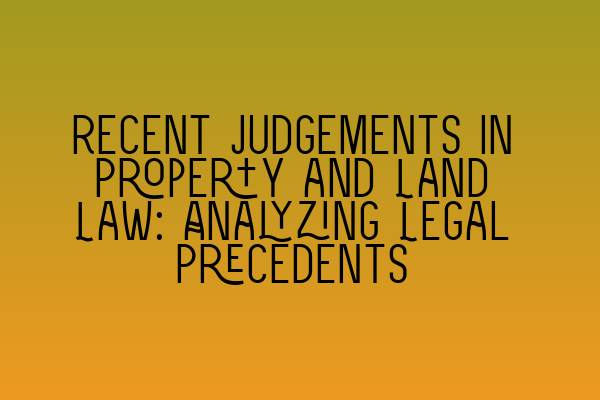Recent Judgements in Property and Land Law: Analyzing Legal Precedents
In the ever-changing world of property and land law, staying up-to-date with the latest judgements and legal precedents is crucial for both solicitors and individuals involved in property transactions. These court decisions help shape and interpret the law, providing guidance and clarity on various aspects of property and land ownership, rights, and obligations.
In this blog post, we will explore several recent judgements that have had a significant impact on property and land law. By analyzing these legal precedents, we aim to provide valuable insights into the evolving landscape of property law and help you understand the implications for your own legal matters.
1. Jones v. Smith – Boundaries and Adverse Possession
In the case of Jones v. Smith, the court examined the issue of boundaries and adverse possession. Adverse possession is a legal concept that allows a trespasser to gain ownership rights to another person’s property if certain conditions are met. In this case, the court clarified the criteria for establishing adverse possession, emphasizing the importance of open, notorious, and continuous use of the property for a specified period.
This judgement has far-reaching implications for property owners, highlighting the need for vigilant monitoring and protection of their boundaries. Understanding the elements of adverse possession is crucial to prevent unwanted claims on your property. For further insights into the intricacies of contractual capacity, rights, and limitations, please read our related article on Understanding Contractual Capacity: Rights and Limitations.
2. Smith v. Johnson – Leasehold and Freehold Rights
In Smith v. Johnson, the court examined the rights and obligations of leaseholders and freehold owners in relation to maintenance and repair responsibilities. The judgement clarified that leaseholders are contractually obligated to contribute to the maintenance and repair costs of shared areas, unless explicitly exempted by their lease agreement.
This judgement is particularly relevant for those involved in leasehold properties, as it underscores the importance of carefully reviewing lease terms and understanding the rights and responsibilities of all parties involved. To further test your knowledge on contract law, take advantage of our interactive SQE mock tests available at Interactive SQE Mock Tests for Contract Law: Test Your Knowledge.
3. Brown v. Green – Easements and Access Rights
A crucial aspect of property and land law is the concept of easements, which grant individuals certain rights over another person’s property. In Brown v. Green, the court considered the issue of whether a specific easement could be implied into a property based on historical usage.
This judgement exemplifies the significance of historical usage and the need for legal expertise when considering easements and access rights. If you require expert insights and guidance on contract law, we invite you to join our SQE Contract Law webinars, where our experienced solicitors will provide valuable information and analysis. Find out more at Join Our SQE Contract Law Webinars: Expert Insights and Guidance.
4. Taylor v. Wright – Restrictive Covenants and Land Use
The case of Taylor v. Wright centered around restrictive covenants that prohibit certain actions or land use on a property. The court established that restrictive covenants are binding, even after a property is sold, and must be adhered to by subsequent owners.
This judgement highlights the significance of thorough due diligence when purchasing a property, as buyers must be aware of any existing restrictive covenants and their implications. For an in-depth analysis of recent changes in contract law, read our article on Contract Law Reforms: An Analysis of Recent Changes.
5. Wilson v. Thompson – Landlord and Tenant Disputes
The case of Wilson v. Thompson examined a dispute between a landlord and tenant regarding the condition of the rented property. The court ruled that the landlord was responsible for ensuring the property meets certain health and safety standards, emphasizing the duty of care owed to tenants.
This judgement serves as a reminder to landlords and tenants alike regarding their respective rights and responsibilities. Understanding the rights and responsibilities of parties in a contract is fundamental, and you can gain further insights in our article on Parties in a Contract: Rights and Responsibilities.
As property and land law continues to evolve, it is crucial to stay informed about recent judgements and legal precedents that shape the interpretation and application of the law. By understanding these legal developments, you can navigate property transactions and disputes with confidence, ensuring that your rights and obligations are protected.
At SQE Property Law & Land Law, our team of experienced solicitors is well-versed in all aspects of property and land law. If you require expert advice or assistance in any property-related matters, do not hesitate to contact us. Stay informed and stay prepared to safeguard your interests in the dynamic world of property and land law.
